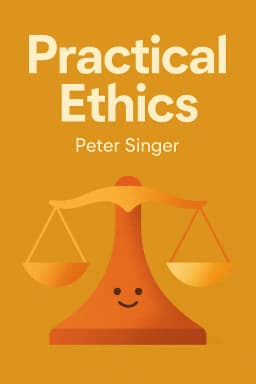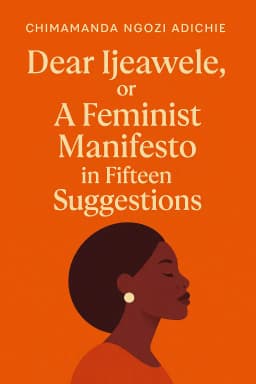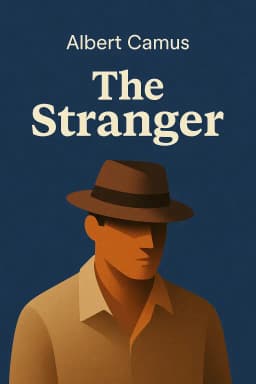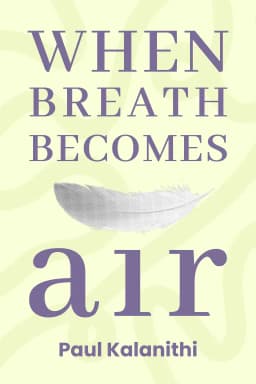
The Moral Checkmate
Golden Hook & Introduction
SECTION
Michael: What if I told you that your love for your dog and your decision to eat a chicken sandwich for lunch are based on the same kind of prejudice as racism? Kevin: Whoa, okay. That's a heavy way to start. Racism is one of the worst things imaginable. You're saying my lunch order is in the same ballpark? That sounds like the kind of statement that would get someone in a lot of trouble. Michael: It is. And it did. It’s a shocking idea, and it’s one that got a world-renowned philosopher actual death threats. His lectures were stormed by protestors, his courses were shut down, all because he dared to apply cold, hard logic to our most cherished moral beliefs. Kevin: Death threats for a philosophical idea? What's that about? Who are we talking about? Michael: We're talking about the Australian philosopher Peter Singer, a bioethics professor at Princeton University. And today, we're diving into his landmark book, Practical Ethics. This book has been a cornerstone of university ethics courses for over thirty years, and it's famous—or infamous—precisely because it forces you to confront these incredibly uncomfortable questions head-on. Kevin: So this isn't just abstract, beard-stroking philosophy. This is the stuff that makes people angry. Michael: Exactly. Singer's whole project is to take ethics out of the ivory tower and apply it to the real world. To our dinner plates, our bank accounts, and even the most difficult decisions about life and death. He’s not interested in what feels good; he’s interested in what’s logically consistent. And that consistency, as we're about to find out, leads to some truly radical places.
The Uncomfortable Mirror: Are We All Speciesists?
SECTION
Kevin: Okay, so let's start with the idea that got him in so much trouble. This link between eating a chicken and racism. How does he even begin to make that argument? Michael: He starts by coining a term: "speciesism." He defines it as a prejudice or attitude of bias in favor of the interests of members of one's own species and against those of members of other species. In the late 80s and early 90s, when he tried to speak in Germany and Austria, the reaction was explosive. Kevin: Why there specifically? Michael: Because of the historical context of the Nazi eugenics programs. The idea of comparing the value of a human life to an animal life, or suggesting some human lives might be less valuable than others, touched an incredibly raw nerve. One German organization passed a motion that said, "The uniqueness of human life forbids any comparison... with other living beings." They saw his logic as a terrifying slippery slope. Kevin: I can understand that fear. But what is Singer's actual argument? He can't just be saying a chicken's life is equal to a human's life, full stop. Michael: He's more subtle than that. He builds on an idea from the 18th-century philosopher Jeremy Bentham. When considering animals, Bentham wrote, "The question is not, Can they reason? nor Can they talk? but, Can they suffer?" For Singer, the capacity for suffering is the vital characteristic that gives a being a right to equal consideration. It's the basis of all other interests. If a being can suffer, its suffering must be counted equally with the like suffering of any other being. Kevin: Okay, "equal consideration of suffering" sounds more reasonable than "equal lives." But humans can suffer in ways animals can't, right? The dread of a future event, the pain of a broken heart, existential angst. A pig doesn't worry about its 401k. Michael: Absolutely. And Singer agrees. He'd say that if you have to choose between saving a human and a mouse from a fire, you should save the human, because the human has a capacity for a richer life, more future-oriented desires, and a deeper understanding of what they're losing. But—and this is the crucial part—that doesn't justify inflicting immense suffering on an animal for a trivial human interest. Kevin: What's a trivial interest? My enjoyment of a bacon cheeseburger? Michael: Precisely. He would argue that the immense suffering of a pig in a factory farm—a highly intelligent, sentient being—far outweighs the minor, fleeting pleasure a human gets from eating it. To ignore the pig's suffering simply because it's a pig is, in his view, speciesism. It's drawing a line based on species, just as a racist draws a line based on race. Kevin: But isn't our intelligence and self-awareness the key difference? We build civilizations, create art, contemplate the universe. That has to count for something. Michael: It does. But Singer traps you with logic here. He presents what's called the "argument from marginal cases." If we say that high intelligence or rationality is what gives human life its special value, what do we do about humans who lack these capacities? Infants, for example, or adults with profound cognitive disabilities. They have less rationality than a healthy adult chimpanzee. Logically, if we use that standard, we should be willing to grant the chimp more rights or perform experiments on the disabled human infant instead of the chimp. Kevin: Wow. Okay, nobody wants to go there. That's a deeply uncomfortable point. It feels like a logical checkmate. Michael: It is. It forces you to admit that the boundary we draw around our species is not based on a morally consistent reason, but on an emotional, tribal preference for "us" over "them." It reminds me of that story about Benjamin Franklin. He was a vegetarian for a while, but one day he saw his friends frying a fish, and when they cut it open, there was a smaller fish inside. He thought, "Well, if you eat one another, I don't see why we mayn't eat you." And he went back to eating meat. Kevin: Ha! That's the most relatable philosopher I've ever heard of. Michael: But as Franklin himself admitted, it was a convenient rationalization. He found a reason for what he already wanted to do. Singer's work is a direct assault on those kinds of convenient rationalizations.
The Drowning Child and Your Wallet
SECTION
Kevin: Alright, the logic on animals is uncomfortably tight. It definitely makes you look at your lunch differently. But I know Singer doesn't just stop with animals. He applies this same kind of relentless logic to something we all deal with every day: money and our obligations to other people. Michael: Yes, and this is where his argument becomes perhaps even more personal and challenging. He presents one of the most famous thought experiments in modern philosophy. It goes like this: You're walking to work, wearing a brand new, expensive pair of shoes. You pass a shallow pond and see a small child has fallen in and is drowning. You're the only one there. You can easily wade in and save the child, but if you do, you'll ruin your expensive shoes. What do you do? Kevin: You save the child. It's not even a question. The shoes are meaningless compared to a human life. Anyone who would hesitate is a monster. Michael: Exactly. Everyone agrees. Now, here comes the punch. Singer argues that we are all in that exact situation, every single day. There are children, right now, dying from preventable, poverty-related diseases like malaria or diarrhea. We know this is happening. We also know that we can prevent it at a very small cost to ourselves. Kevin: How small a cost? Michael: Well, organizations like GiveWell estimate you can save a life for somewhere in the range of $600 to $1200. That's the cost of a new iPhone, a fancy dinner out, or... a pair of expensive shoes. Singer's point is that if you would save the drowning child in the pond, but you don't donate that money to save a child dying of malaria, you are living in a state of moral contradiction. The distance and nationality of the child don't change the core ethical calculus. Kevin: Okay, my gut reaction is to say it feels different. The drowning child is right in front of me, it's an immediate, one-time emergency. Global poverty is a massive, complex, never-ending problem. Michael: He anticipates that objection. He asks: why does proximity matter morally? Is a child's life less valuable because they are 5,000 miles away? And is it morally relevant that others are also walking past and doing nothing? If there were 100 people around the pond and none of them were helping, would that absolve you of your responsibility to act? Kevin: No, it would just make them all monsters, too. But the scale of it is overwhelming. If I follow this logic, where does it end? Am I supposed to give until I'm at the same level as the people I'm helping? Do I have to sell my house, like that Salwen family you sometimes hear about who gave away half their home's value? Michael: That's the "too high a standard" objection, and it's a powerful one. Singer acknowledges this. He distinguishes between what we should publicly advocate for—maybe a modest but significant percentage of income—and what the logic itself demands. His primary goal isn't to make everyone feel guilty. It's to shatter the illusion that our choice is between "charity" and "no charity." He reframes it. For him, when you spend money on a luxury you don't need, you are not just passing up an opportunity to do good; you are actively choosing to let someone die whom you could have easily saved. Kevin: That is a brutal reframing. It takes the warm, fuzzy feeling out of charity and replaces it with a cold, hard moral obligation. Michael: That's Practical Ethics in a nutshell. It's not about feeling good. It's about doing what is right, according to reason.
The Bright Line Problem: When Does a Life Have Value?
SECTION
Michael: And this is where applying that principle of 'equal consideration of interests' leads to Singer's most controversial and, for many, most disturbing conclusions. It's not just about animals or poverty. It's about life itself. Kevin: I have a feeling this is where it gets really tough. Michael: It is. Singer forces us to make a crucial distinction: the difference between being a 'human being'—a biological member of the species Homo sapiens—and being a 'person.' For him, a 'person' is a being who is rational, self-aware, and has a sense of themselves existing over time. Kevin: So, a normal adult human is a person. A chimpanzee, based on the evidence we have, might qualify as a person. Michael: Correct. But a human fetus is not. Neither, he argues, is a newborn infant. They are conscious, they can feel pain, and their suffering matters. But they are not self-aware in the way a 'person' is. They don't have desires for their future. Kevin: And this is where the arguments about abortion and infanticide come in. This is where people get off the bus. Michael: This is the stop. Let's look at a real-world case that illustrates the dilemma. In 1982, a baby was born in Indiana, known only as 'Baby Doe.' The baby had Down syndrome and also a detached esophagus, which was a life-threatening but surgically correctable condition. The parents, advised by their doctor that a life with Down syndrome would not be a happy one, refused consent for the surgery. Kevin: So they chose to let the baby die. Michael: Yes. The hospital took them to court, but the courts upheld the parents' right to decide. Baby Doe starved to death over six days. The case caused a national uproar. Now, Singer would ask: what is the morally relevant difference between the parents' decision and a late-term abortion of a fetus diagnosed with the same conditions? The baby's location—inside or outside the womb—doesn't change its essential nature. It's not a 'person' in his philosophical sense in either place. Kevin: Wow. The logic is consistent, but the conclusion is horrifying to most people's intuition. The idea of justifying infanticide, even in these incredibly tragic cases, feels like a monstrous slippery slope. It's one thing to apply logic to chickens, it's another to apply it to a newborn baby. Michael: He confronts the slippery slope argument directly. He would say our current system is already a mess of inconsistent, emotionally-driven lines. We accept that someone who is 'brain dead' is no longer a person and we can turn off their life support, even if their body is still biologically alive. But we struggle to say that an anencephalic infant—one born without a brain—is not a person. Singer argues that a clear, consistent ethic, even if it leads to difficult conclusions, is a stronger defense against injustice in the long run than an ethic based on taboos and contradictions. Kevin: So he's saying our squeamishness is actually a weaker moral position. Michael: He's saying our refusal to think logically about these issues because they are emotionally difficult is a form of intellectual cowardice. He believes that if a being, human or not, has no chance of a life with a positive balance of pleasure over pain, and has no self-aware desire to live, then a painless death is not a tragedy. For him, the wrongness of killing is tied to the thwarting of a being's desires and preferences for the future. A newborn infant doesn't have those yet. Kevin: It's just... it's hard to separate the biological human from the philosophical 'person.' Our instincts scream that they're the same thing. Michael: And that's the central challenge of the entire book. Practical Ethics is a war on our instincts.
Synthesis & Takeaways
SECTION
Michael: So when you pull back and look at the whole picture, you see the thread connecting everything. Whether it's a pig in a factory farm, a child dying of malaria thousands of miles away, or a severely disabled infant in a neonatal ICU, Singer's whole project is a relentless attack on our emotional, tribal intuitions. Kevin: He's trying to get us to stop thinking with our gut. Our gut tells us to care more about the people who look and live like us. Our gut tells us humans are special. Our gut tells us a baby is sacred the moment it's born. Michael: Exactly. He's forcing us to replace the question 'Who is in my group?' with a much harder, more universal question: 'Whose interests are at stake?' And if a being has an interest in not suffering, we must consider it, regardless of its species, location, or cognitive ability. Kevin: It's profoundly uncomfortable. It feels like he's trying to turn us into moral calculators, stripping out the humanity and emotion that make us... well, human. But you can't deny the power of the logic. It's like a mathematical proof. It corners you. Michael: And it leaves you with a really tough question, one that I think is the ultimate takeaway from this book. Kevin: What's that? Michael: Is it better to live by a flawed, comfortable morality that feels right but is full of contradictions? Or is it better to live by a logical, consistent morality that is deeply, deeply uncomfortable? Kevin: I don't have an easy answer for that. And I suspect most people don't. This is one of those books that doesn't give you answers so much as it ruins your ability to be comfortable with the answers you already had. Michael: That's a perfect way to put it. And it's a debate that's worth having. This is one of those books that sparks intense discussion, and we'd love to hear where you all draw the line. Find us on our socials and let us know your take on the Drowning Child, or speciesism, or any of these difficult ideas. Kevin: Be prepared for some heated comments on this one. Michael: I'm counting on it. Michael: This is Aibrary, signing off.









